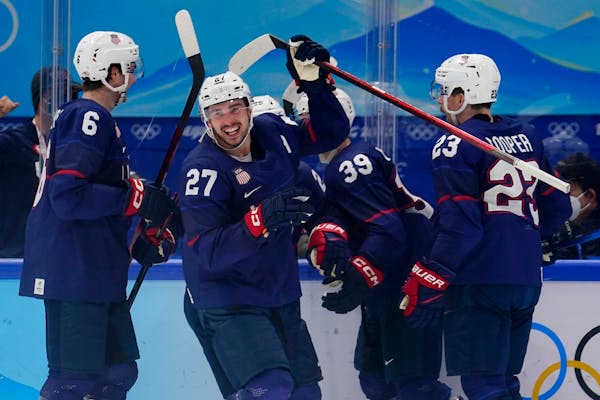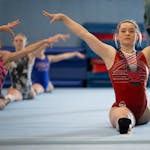 See
more of the story
See
more of the story
BEIJING — Less then one minute into Thursday's game against China, Team USA got a glimpse of what it might face throughout the Olympics.
China's Zesen Zhang came in with an elbow raised to Team USA defenseman Brock Faber, sending him crashing into the boards. Faber, who plays for the Gophers, went to the bench and needed a few minutes to shake off the hit.
That was the first of a series delivered by China that put a couple USA players on their keisters and slowed up some others. China was significantly overmatched but was going to take it to a United States team loaded with 15 college players to see how they handled it.
"A little adversity early is always a good thing," said USA forward Brian O'Neill, the only returning player from the 2018 team that was knocked out in the quarterfinals in Pyeongchang. "They did a really good job of coming out in front of their home crowd, laying nice hits on us.
"Getting exposed to that early can be very beneficial once we get to the next game."
Big forward Ye Jinguang was looking to hit anyone near him until Justin Abdelkader — and I had to look him up to make sure it was the same one who played 13 seasons with the Red Wings and not a relative — engaged him later in the opening period.
Team USA played the first period as if its fuel injectors were clogged. Brendan Brisson did open the scoring late in the period, but China had acquitted itself well. The team was nearly removed from the Olympics over concerns that it would not be able to play up to international standards. The Chinese did what they could to boost the roster, finding their version of an international transfer portal to get 11 Canadians and seven Americans to play for them. One American on the China squad is Jake Chelios, son of USA legend Chris Chelios.
China made things interesting for one period. Team USA figured out that it had to move the puck quicker to reduce the physical play and then let its playmakers do their thing. The machine started working to near perfection, as the USA scored three goals in the second and four more in the third.
What was encouraging to USA coach David Quinn was that he saw his lads process through what was happening and make their own adjustments.
"One hundred percent," Quinn said. "You could see the tempo in the offensive zone get better as the game went on, and I think that comes playing with each other, even within the game."
The skill level gushed from Team USA in the second period.
Noah Cates, a Stillwater native who plays for Minnesota Duluth, buried a no-look pass from Sean Farrell for a 2-0 lead. O'Neill made it 3-0 near the nine-minute mark. Faber's poke check led to a three-on-two break, with Farrell roofing a shot past China goaltender Jeremy Smith just before the end of the period for a 4-0 lead. The rout was on.
Farrell, a forward from Harvard, had a hat trick and two assists to lead the USA. Ben Meyers, the Gophers leading scorer, added a goal and had two assists. Meyers' fellow Gophers also played well, as Faber and Matt Knies each had an assist. Knies also had a team-high six shots and was a forechecking fiend.
Quinn expects more opponents to take the same approach with a team that is fast, skilled and young. USA's first line on Thursday had an average age of 31.8 years old. The second line was 22.0. So, yeah, that's going to be a thing during these Olympics. And teams are going to be decisively more talented than China as they bring the lumber. It might start when Team USA faces Canada. on Saturday (10:10 p.m. Friday night Minnesota time).
This time, the United States will be ready for it.
If Team USA proves it can play its game despite teams being physical, opponents could be in trouble.




